

Personality-Based Emotional Intelligence Test. This is an interactive version of the Personality-Based Emotional Intelligence Test.
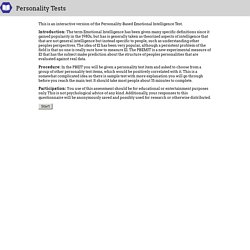
Introduction: The term Emotional Intelligence has been given many specific definitions since it gained popularity in the 1980s, but has is generally taken as theorized aspects of intelligence that that are not general intelligence but instead specific to people, such as understanding other peoples perspectives. The idea of EI has been very popular, although a persistent problem of the field is that no one is really sure how to measure EI.
The PBEMIT is a new experimental measure of EI that has the subject make prediction about the structure of peoples personalities that are evaluated against real data. Procedure: In the PBEIT you will be given a personality test item and asked to choose from a group of other personality test items, which would be positively correlated with it. Participation: You use of this assessment should be for educational or entertainment purposes only. Test Your Emotional Intelligence, Free EQ Quiz, EI Test. Research from Harvard Business School demonstrated that EQ counts for twice as much as IQ and Technical Skills in determining who will be successful!
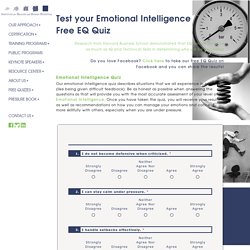
Do you love Facebook? Click here to take our free EQ Quiz on Facebook and you can share the results! Emotional Intelligence Quiz Our emotional intelligence quiz describes situations that we all experience in our lives (like being given difficult feedback). Be as honest as possible when answering the questions as that will provide you with the most accurate assessment of your level of Emotional Intelligence. <div id="no-js-warning"><p>We've detected that Javascript is not enabled. Emotional Intelligence - Develop your soft skills at MindTools.com. Developing Strong "People Skills" Learn how to develop your emotional intelligence.
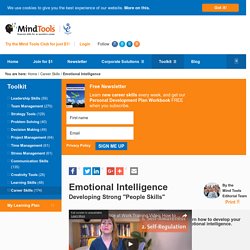
We probably all know people, either at work or in our personal lives, who are really good listeners. No matter what kind of situation we're in, they always seem to know just what to say – and how to say it – so that we're not offended or upset. They're caring and considerate, and even if we don't find a solution to our problem, we usually leave feeling more hopeful and optimistic.
We probably also know people who are masters at managing their emotions. People like this have a high degree of emotional intelligence, or EI. Would you like to be more like this? As more and more people accept that EI is just as important to professional success as technical ability, organizations are increasingly using EI when they hire and promote. For example, one large cosmetics company recently revised their hiring process for salespeople to choose candidates based on their EI.
How to Develop Emotional Intelligence: 15 Steps. Edit Article Three Parts:Tapping Into Your EmotionsConnecting With Other PeoplePutting EQ to Practical UseQuestions and Answers Emotional intelligence (EQ) is the ability to tap into your emotions and use them to make your life better.
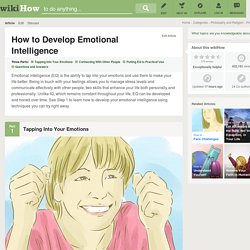
Being in touch with your feelings allows you to manage stress levels and communicate effectively with other people, two skills that enhance your life both personally and professionally. Unlike IQ, which remains constant throughout your life, EQ can be developed and honed over time. How to Increase Your Emotional Intelligence ― 6 Essentials. How to Be Emotionally Intelligent. Photo What makes a great leader?
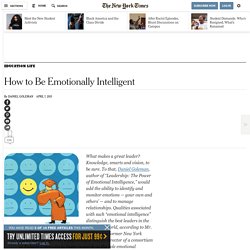
Knowledge, smarts and vision, to be sure. To that, , author of “Leadership: The Power of Emotional Intelligence,” would add the ability to identify and monitor emotions — your own and others’ — and to manage relationships. Qualities associated with such “emotional intelligence” distinguish the best leaders in the corporate world, according to Mr. Goleman, a former New York Times science reporter, a psychologist and co-director of a consortium at Rutgers University to foster research on the role emotional intelligence plays in excellence. Realistic self-confidence: You understand your own strengths and limitations; you operate from competence and know when to rely on someone else on the team. Emotional insight: You understand your feelings.
Resilience: You stay calm under pressure and recover quickly from upsets. Self-motivation: You keep moving toward distant goals despite setbacks. Team playing: People feel relaxed working with you. Emotional Intelligence.